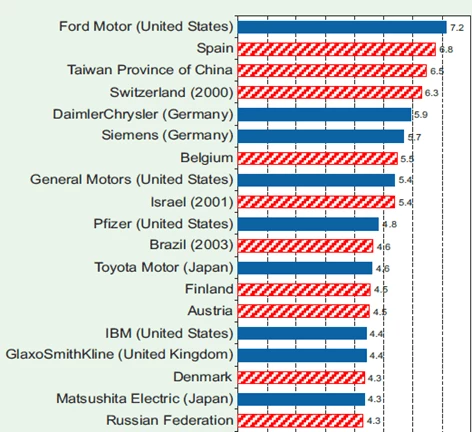Policy makers across the globe court foreign firms with an aim to create new jobs in their economies.
But are these jobs good?
Some jobs do more than others to help reduce poverty, but perhaps more importantly, they increase overall expertise within an economy. If we accept this premise, developing countries should focus not only on creating jobs, but on creating good jobs.
From a worker’s perspective, a good job leads to a higher standard of living—it provides higher earnings, greater potential for growth in earnings, and higher satisfaction. From a country’s perspective, good jobs are more productive than the country average, have greater productive externalities, and more potential to be increasingly productive over time.
My recent paper in the World Bank Research Observer ( Javorcik 2015) reviews the literature on jobs created as a result of FDI inflows, and asks whether they can be considered ‘good.’
The worker’s perspective
From the worker’s perspective jobs created by foreign affiliates are good because they pay higher wages (at least in emerging markets). For instance, evidence from Hungary and Brazil suggests a premium of between 4.5 and 6 percent in foreign affiliates above and beyond what workers with similar characteristics would receive in comparable firms.
A theoretical argument for the FDI wage premium has been proposed by Egger and Kreickemeier (2013). There are two sources of an FDI wage premium in their model. First, because foreign affiliates are more productive, they earn higher profits and therefore pay higher wages. The second effect is a firm-level wage effect: foreign affiliates pay more because their parent company has higher global profits.
Employment in a foreign affiliate may also be more rewarding for the worker if it offers more opportunities for training and professional development. For instance, foreign-owned firms in the Czech Republic spent 4.6 times more than domestic firms on hiring and training ( Filer et al. 1995). Foreign-owned firms in Malaysia also provided more training to their workers than did domestic enterprises ( World Bank 1997). Anecdotal evidence additionally suggests that foreign affiliates tend to have a more meritocratic culture that makes them more appealing employers, particularly for female workers, in more traditional societies such as Japan.
The host country’s perspective
Jobs created as a result of FDI inflows are good from the country’s perspective because their productivity is above the country’s average and they are likely to increase expertise within the economy.
This is because multinationals are creators of knowledge. In 2002, 700 firms, 98 percent of which were multinational corporations, accounted for 46 percent of the world’s total R&D expenditure and 69 percent of the world’s business R&D. As illustrated in the chart below, public R&D budgets in countries such as Spain, Switzerland or the Russian Federation look rather unimpressive in comparison to some of the multinational corporations’ R&D spending.
Chart 1. R&D expenditure by selected multinationals and economies, 2002
(Billions of dollars)

Source: UNCTAD (2005).
Further, multinationals transfer knowledge to their affiliates abroad. For instance, Indonesian plants that received FDI exhibited 13.5% faster productivity growth than plants with similar observable characteristics, operating in the same industry in the same year, that did not receive FDI ( Arnold and Javorcik 2009).
Most importantly, there is ample evidence supporting the existence of knowledge spillovers. Knowledge spillovers occur when knowledge created by a multinational is used by an indigenous firm and the indigenous firm does not (fully) compensate the multinational. Typically, this happens through the demonstration effect (indigenous firms obtain knowledge about new products, technologies, marketing and management strategies or business opportunities in foreign markets by observing the actions of foreign affiliates), movement of labor (indigenous firms hire workers trained by multinationals) or the transfer of knowledge from foreign affiliates to their suppliers or customers (provided affiliates are not compensated for the transfer).
The second type of externality is financial, and takes place through firm-to-firm purchases and sales when in a properly functioning market. For instance, if the entry of foreign affiliates into downstream sectors creates increased demand for inputs, it may create incentives for indigenous firms to invest in product upgrading, cost-saving technologies or increased capacity, all of which may lead to better performance. The entry of foreign affiliates may also change the market structure and increase the level of competition in a manner similar, for instance, to trade liberalization leading to competitive externalities.
In sum, the existing evidence is in line with the view that jobs created through FDI inflows are good jobs, both from the worker’s and the country’s perspective.
Some jobs do more than others to help reduce poverty, but perhaps more importantly, they increase overall expertise within an economy. If we accept this premise, developing countries should focus not only on creating jobs, but on creating good jobs.
From a worker’s perspective, a good job leads to a higher standard of living—it provides higher earnings, greater potential for growth in earnings, and higher satisfaction. From a country’s perspective, good jobs are more productive than the country average, have greater productive externalities, and more potential to be increasingly productive over time.
My recent paper in the World Bank Research Observer ( Javorcik 2015) reviews the literature on jobs created as a result of FDI inflows, and asks whether they can be considered ‘good.’
The worker’s perspective
From the worker’s perspective jobs created by foreign affiliates are good because they pay higher wages (at least in emerging markets). For instance, evidence from Hungary and Brazil suggests a premium of between 4.5 and 6 percent in foreign affiliates above and beyond what workers with similar characteristics would receive in comparable firms.
A theoretical argument for the FDI wage premium has been proposed by Egger and Kreickemeier (2013). There are two sources of an FDI wage premium in their model. First, because foreign affiliates are more productive, they earn higher profits and therefore pay higher wages. The second effect is a firm-level wage effect: foreign affiliates pay more because their parent company has higher global profits.
Employment in a foreign affiliate may also be more rewarding for the worker if it offers more opportunities for training and professional development. For instance, foreign-owned firms in the Czech Republic spent 4.6 times more than domestic firms on hiring and training ( Filer et al. 1995). Foreign-owned firms in Malaysia also provided more training to their workers than did domestic enterprises ( World Bank 1997). Anecdotal evidence additionally suggests that foreign affiliates tend to have a more meritocratic culture that makes them more appealing employers, particularly for female workers, in more traditional societies such as Japan.
The host country’s perspective
Jobs created as a result of FDI inflows are good from the country’s perspective because their productivity is above the country’s average and they are likely to increase expertise within the economy.
This is because multinationals are creators of knowledge. In 2002, 700 firms, 98 percent of which were multinational corporations, accounted for 46 percent of the world’s total R&D expenditure and 69 percent of the world’s business R&D. As illustrated in the chart below, public R&D budgets in countries such as Spain, Switzerland or the Russian Federation look rather unimpressive in comparison to some of the multinational corporations’ R&D spending.
Chart 1. R&D expenditure by selected multinationals and economies, 2002
(Billions of dollars)

Source: UNCTAD (2005).
Further, multinationals transfer knowledge to their affiliates abroad. For instance, Indonesian plants that received FDI exhibited 13.5% faster productivity growth than plants with similar observable characteristics, operating in the same industry in the same year, that did not receive FDI ( Arnold and Javorcik 2009).
Most importantly, there is ample evidence supporting the existence of knowledge spillovers. Knowledge spillovers occur when knowledge created by a multinational is used by an indigenous firm and the indigenous firm does not (fully) compensate the multinational. Typically, this happens through the demonstration effect (indigenous firms obtain knowledge about new products, technologies, marketing and management strategies or business opportunities in foreign markets by observing the actions of foreign affiliates), movement of labor (indigenous firms hire workers trained by multinationals) or the transfer of knowledge from foreign affiliates to their suppliers or customers (provided affiliates are not compensated for the transfer).
The second type of externality is financial, and takes place through firm-to-firm purchases and sales when in a properly functioning market. For instance, if the entry of foreign affiliates into downstream sectors creates increased demand for inputs, it may create incentives for indigenous firms to invest in product upgrading, cost-saving technologies or increased capacity, all of which may lead to better performance. The entry of foreign affiliates may also change the market structure and increase the level of competition in a manner similar, for instance, to trade liberalization leading to competitive externalities.
In sum, the existing evidence is in line with the view that jobs created through FDI inflows are good jobs, both from the worker’s and the country’s perspective.


Join the Conversation